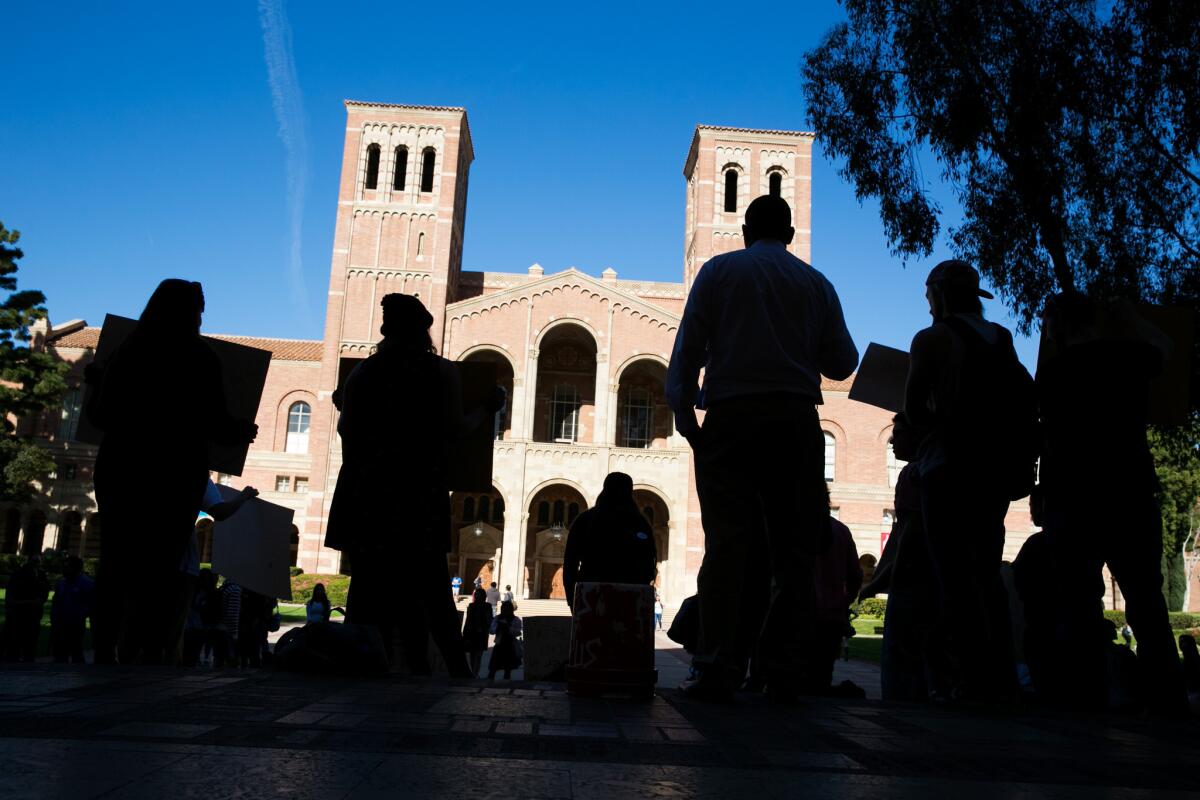UC widens vaccination requirements for 2017

- Share via
All UC students will have to be vaccinated against measles, meningitis, whooping cough and several other diseases or they will not be allowed to register for classes in fall 2017, university officials announced Friday. Those shots will be in addition to the current systemwide requirement for the hepatitis B vaccine.
The announcement has been in the works for years and was not triggered by the measles scare that has rattled the state, according to Gina Fleming, a high-ranking UC health official.
If anything, she said, it was pushed by the 2013 meningitis outbreak at UC Santa Barbara that sickened four students and led to the amputations of one student’s legs below the knees, she said.
Some of UC’s 10 campuses already have vaccination requirements that go beyond hepatitis B, but this new policy will make it clear far in advance that all 230,000 UC students need to be screened for tuberculosis and show proof of four vaccines: those for measles, mumps and rubella; chicken pox; meningococcus; and tetanus, diphtheria and whooping cough.
For most students, that will mean simply showing their yellow card recording inoculations that go back to early childhood, but for some it will mean visits to their own doctor or to UC clinics, officials said.
UC is giving 2 1/2 years’ notice to make sure everyone is adequately warned and has time to take the needed steps, said Fleming, medical director for UC Student Health Insurance Plan. “We want to phase this in so we are very intentional and comprehensive in reaching students prior to putting a hold on their registrations,” she said.
The 23-campus Cal State system has required immunizations against measles, rubella and hepatitis B since 2002 and has encouraged the anti-meningitis vaccine for those who live in dormitories. A Cal State spokesman said Friday that it had no plan in the works to widen the list of required shots. California’s community colleges do not have any statewide requirements, officials said.
Many private colleges long have had such mandates, some linked to whether students are allowed to live in dorms.
UC will allow exemptions for medical or religious reasons, and the procedures for that are being worked out. Having the names of students who opt for exemptions will prove beneficial in case there is an outbreak of a disease for which they are not immunized, according to UC spokesperson Shelly Meron.
“If we know who they are, this will allow us to get in touch and warn them and encourage them to get vaccinated,” she said.
Officials said they had no estimates on how many students might apply for the exemptions or how many may lack some of the vaccines at this point.
Gov. Jerry Brown appeared open this week to legislation that would eliminate all but medical waivers for the measles and other vaccines required for elementary and high schools. The governor’s new flexibility highlighted momentum toward limiting vaccination exemptions that are partly blamed for the state’s worst outbreak of measles since 2000.
Sadia Saifuddin, the UC student representative on the regents board, said Friday that she expects the overwhelming majority of UC students to be pleased with the vaccination requirement and foresees very little debate about it.
The close quarters of college life — in dorms, classrooms, cafeterias, gyms — “makes this kind of protection all the more important,” said Saifuddin, who attends UC Berkeley. Students know they “are responsible for the health of others.”
Under the Affordable Care Act, the price of the vaccines is supposed to be covered by UC and private health insurance plans at no extra cost to consumers. And starting in 2016, a new electronic medical record system will make it easier for UC students to enter their vaccination dates and information.
UC is studying ways to ensure the veracity of the data, including possible random checks of documents, Meron said.
Much of the debate over vaccines has involved the fears of some parents that the immunizations could have unintended negative health effects on infants and young children. But those concerns are expected to be much less with a college-aged population, Fleming said.
Since most of the UC students will be older than 18, they can make decisions without parental approval. “There may be some pushback, but I don’t think it will be the same as with young children entering elementary or preschool,” she said.
The American College Health Assn. last year urged that all campuses require an array of vaccinations, including the one for measles, and that schools should try to prevent nonmedical exemptions.
The organization said that a college student who requests a nonmedical waiver should be counseled by a health service professional and that campuses should consider banning students who aren’t immunized from school during outbreaks of vaccine-preventable diseases.
Twitter: @larrygordonlat
More to Read
Sign up for Essential California
The most important California stories and recommendations in your inbox every morning.
You may occasionally receive promotional content from the Los Angeles Times.














